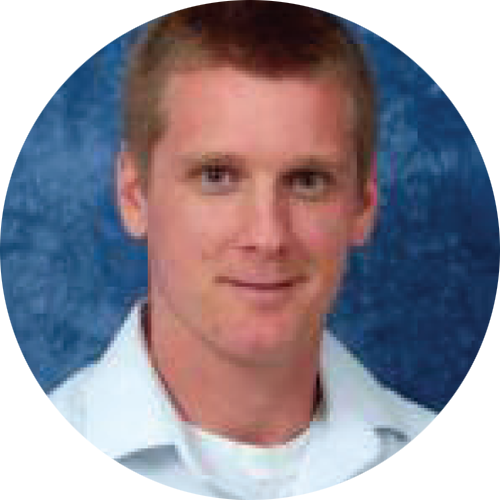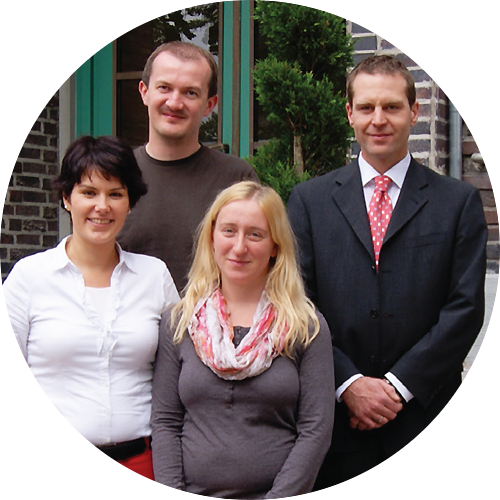
Q: What is the focus of your lab’s research?
A: Medicinal chemistry research in my lab is a collaborative exercise where we engage other scientists with complementary interests. Currently, we are engaged in the discovery of protein kinase inhibitors for anti-infective and anti-inflammatory applications and in the discovery of new agents useful for the potential treatment of neurodegenerative diseases. We are working with others at MSU as well as scientists in other universities and research institutes.
Q: Why did you incorporate the expression CMS into your laboratory?
A: As a medicinal chemist working in the industry, I wanted to have access to the same technology for my group’s research at MSU. However, working in the industry I had experts to run samples. In my lab at MSU, it is essential to have the same technology available in an easy to use the instrument. Not only do the expression CMS specifications meet our needs perfectly, but also it runs without a hitch and it is easily serviceable by a non-expert.
Q: Who would you recommend to purchase the expression CMS?
A: I would recommend the expression CMS to any non-expert chemist or laboratory who needs access to this level of technology. The Advion service and support groups make it accessible.
Q: WHAT IS THE FOCUS OF YOUR LAB’S RESEARCH?
A: The focus of the team is to develop innovative products and applications for thin layer chromatography (TLC). Intensive research and development is done to couple TLC with mass spectrometry (TLC/CMS), a field of growing interest.
Q: WHAT PREVIOUS WORKFLOW CHALLENGES DID YOU EXPERIENCE?
A: Our major workflow issue is to shorten product development times and to deliver our customer valuable applications for new products. The CMS in combination with the elution based TLC/MS interface supports us reaching these goals.
Q: WHY DID YOU INCORPORATE THE EXPRESSION CMS INTO YOUR LABORATORY?
A: The expression CMS is a compact, robust and easy-to-use instrument. Together with the elution based TLC/MS interface, an affordable complete system is on the market, providing a great opportunity that can advance the TLC/CMS technology.

Q: What is the focus of your lab’s research?
A: The development of macromolecular materials that combine synthetic polymerization techniques with the capacity of peptides and other biologically relevant molecules to participate in supramolecular interactions will lead to a variety of new responsive materials. When applied in vivo, a vital characteristic of these new materials will be their biodegradability, allowing the carrier to break down into benign metabolites. My lab focuses on the synthesis of biodegradable polymeric and self-assembling structures and their application in a broad variety of fields, including regenerative medicine, cancer therapeutics, drug delivery, and signaling gas delivery.
Q: What was your previous work flow or challenges?
A: We make and purify a lot of peptides, some of which are unstable under preparative HPLC purification conditions. By using rapid MS analysis to confirm the identity of an HPLC peak, we can quickly workup the product-containing fractions before they decompose. This was nearly impossible before we moved to the Advion system. Our peptides routinely have molecular weights in excess of 2000 g/mol, which we can identify by looking at multiply charged species. We use the expression® CMS for characterizing peptides several times during a difficult synthesis to optimize our synthesis and purification methods. My group has also found that the CMS system is extremely helpful in small molecule synthesis, where we use it to quickly verify that a product has formed in a reaction before proceeding to workup and isolation steps.
Q: Why did you incorporate the expression® CMS into your laboratory?
A: We incorporated the CMS system in our lab to speed up workflow and to enable us to synthesize peptides and peptide conjugates that are deliberately unstable. It has sped up small molecules and peptide synthesis as well as allowed us to do qualitative decomposition studies on our compounds.
Q: Who would you recommend to purchase the expression® CMS?
A: I think that nearly any lab that does significant small molecule and/or peptide synthesis would benefit from this instrument. There is no substitute for having a mass spectrometer a few steps away from your bench. Analyses require very little sample and are often as quick as a few minutes, making the CMS system a more efficient analytical technique than 1H NMR for rapid product confirmation.
The rapid identification of radiolabeled compounds would clearly be beneficial for applied clinical and preclinical tracers used for imaging with positron emission tomography (PET). The limited uptake of mass spectrometry in the imaging field has been due to several factors including concerns regarding adequate sensitivity, instrument footprint in the highly constrained space requirements for the majority of labs and high initial capital costs plus high ongoing maintenance costs.
The introduction of the expression Compact Mass Spectrometer (CMS) at the 2012 Spring ACS National Meeting addressed for the first time three of the concerns: space, capital cost and maintenance costs. Only the question of adequate sensitivity remained to be answered.
The Advion expression Compact Mass Spectrometer (CMS) was coupled to a Normal Phase Flash Chromatography system for mass directed fraction collection. Typically a UV detector is used to monitor compounds eluting from Normal Phase columns. A limitation of the UV detector is that it relies on compounds having a chromophore in the chemical structure, hence an analyte of interest may not be detectable if it lacks a suitable UV chromophore or coelutes with another compound. In addition, solvent systems can interfere with and hinder UV absorbance. The Advion expression CMS provides the ultimate in selectivity, unambiguously identifying residual starting materials, desired product ions, side reactants and impurities by their molecular weight despite co-eluting compounds and solvent peaks. Mass directed fraction collection greatly speeds up the chemist’s work flow with confidence in the content and purity of the collected fractions by eliminating off-line TLCs, workup and core lab LC/MS assays.

Q: What is the focus of your lab’s research?
A: Our laboratory is primarily a teaching laboratory for undergraduate and graduate students to gain exposure to current chemistry technology. Several techniques are practiced for medicinal chemistry and synthetic organic chemistry applications including TLC, reaction monitoring, and UV-vis.
Q: Why did you incorporate the expression cMs into your laboratory?
A: As a small university, we face unique challenges of limited resources in both space and funding. Mass spectrometers are a powerful detector, and it is important that our students gain exposure to this analytical technique; however, purchasing one was out of our reach. The expression CMS has allowed us to not only bring this commonly used technology to the hands of our students, but also has resulted in faster data. Our students no longer have to wait up to a month for results from an outsourced partner. They know right away whether what they set to accomplish was successful.
Q: Who Would you recoMMend to purchase the expression cMs?
A: I recommend the expression CMS to all teaching labs that wish to expose their students to this technology in a fast and easy-to-use platform.
The expression® compact mass spectrometer (CMS) was developed based on decades of chemistry and mass spectrometry experience specifically to meet the needs of chemists. Many chemists are asked to perform their work in the field, and the CMS was built to be versatile. It is available with a TACOM-compliant Mobile Attenuation Mounting (MAM) system. This allows the CMS to be placed in a mobile laboratory environment and driven for the equivalent of the life of the vehicle while remaining fully functional to all specifications. Many global FDA agencies, state labs, Level 1 responders, and others wish to install CMS in a mobile laboratory setting taking the CMS to a field-based point-of-assay. In certain instances, large corporations wish to have the unit fully transportable within large plant settings. The MAM system is developed to international operating standards.
The flexibility of the CMS can be seen in a recent poster presentation given at this year’s ASMS meeting in Minneapolis. The poster is available for download.

Q: What is the focus of youR lab’s ReseaRch?
A: Our activities on lignin chemistry cover the extraction of lignin by the organosolv process, characterization of lignin and development of catalysts for lignin hydrogenolysis, oxidation and depolymerization.
The similarity between the chemical structures of low ranking coals and lignin encourages us to develop integrated strategies to process coal and biomass together. Our activities on coal chemistry cover the direct coliquefaction of low ranking coals and biomass to produce liquid fuels.
Furthermore, we are aiming at understanding the process of dissolution of cellulose in nonconventional solvent systems and are exploring the reactivity of cellulose in new solvent systems.
Q: What pRevious WoRkfloW challenges DiD you expeRience?
A: Many scientists generating a high number of diverse compounds need fast and direct access to the exact mass data for those compounds. Thus, we had to find a way to conduct most of the mass determination directly in our laboratory in a timely and cost-efficient way.
Q: Why DiD you incoRpoRate the expRession cMs into youR laboRatoRy?
A: The purchase of Advion expression compact mass spectrometer reveals to be an excellent investment. We are performing analyses of complex samples (e.g., lignin, cellulose and coal products) in a multi-user environment. As such, the Advion device is very easy to operate as well as a robust and very reliable mass spectrometer, surpassing all the expectations that we had for an affordable device.
In this study we evaluated the performance of a Preparative SFC‐MS system combining the JASCO Preparative SFC with the Advion expression® CMS (Compact Mass Spectrometer) utilizing a simplified passive splitter for mass‐directed fraction collection. The initial test explored a wide range of flow rates both isocratic and gradient to test performance and reliability of the passive splitter, coinciding timing of MS and UV signal and the clearance of the source with highly concentrated samples.
There is a concerted effort by regulatory bodies, such as the EPA to reduce the exposure of environmental contaminants, such as inorganic anions to humans and the environment.
Achieving lower analytical detection limits of hazardous compounds in environmental matrices such as water, soils and sediments allows regulatory bodies to make better informed decisions on the degree of contamination of an environmental system as well as the remedial actions required to limit adverse health and environmental effects.
Mass spectrometry provides the tool to achieve lower detection limits and greater selectivity when compared to conductivity and UV detectors.





